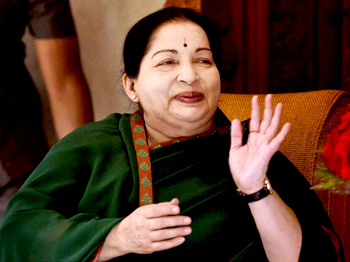Chennai, Nov 25: Tamil Nadu Chief Minister Jayalalithaa is doing well and speaks using a valve attached to the tracheostomy tube as she continues to get treatment, Apollo Hospitals Chairman Dr Prathap C Reddy said here today.
 Reddy said the Chief Minister, who is getting whole body physiotherapy, is undergoing a "normal recuperation" after being in bed for several weeks and it is she who would decide when to go home.
Reddy said the Chief Minister, who is getting whole body physiotherapy, is undergoing a "normal recuperation" after being in bed for several weeks and it is she who would decide when to go home.
Asked whether she has any trouble in speaking, he told reporters "...she speaks from a few seconds to a few minutes... but she is not in a hurry."
Reddy said with tracheostomy, "normally they (patients) cannot speak. It also has a speaker attached. She uses that speaker (valve), but it is not easy for a person to speak with a speaker because they have to hold their breath."
Speaking on the sidelines of a programme on organ donation, he said that for some patients, tracheostomy (a tube and attached valve for communication) may be permanent. Only such patients are trained to use and speak using the speaker.
In Jayalalithaa's case, "it was only temporary and she need not go through it.. (need not have it permanently). We also do not spend time in training her to use that speaker", he said.
The chairman said that normally, the tracheostomy tube is left in the patient. "She (Jayalalithaa) is breathing on her own most of the time... 90 per cent... we just leave it as one will become more comfortable," he said.
On physiotherapy, he said the Chief Minister was getting whole body physiotherapy, both static as well as active. Physiotherapists were also encouraging her to do exercises.
Explaining what he termed was the 'set pattern', he said for each organ there is a specific way of doing physiotherapy, all of which was being followed.
The next thing to do is to see if the Chief Minister stands up and walks and then she would be ready to go home.
"If you ask me when that will happen, I told you she is a very strong Chief Minister, she has a very strong mind and she will tell you all. Not me."
The Chief Minister is "absolutely well today and it is she who would decide (to go home), not the health minister or health secretary... only when she realises, feels that everything is perfect," Reddy added.
On the recent shifting of the Chief Minister to a room from the Critical Care Unit, he said the intensive care team and all specialists, including cardiologists, nephrologists and a pulmonologist decided she could be managed in a normal room where she will feel much more happy.
Hence, she did not need the same care as she did in the first few weeks, he said.
"I am glad to say that at Apollo with a wonderful team of doctors they could give back all of the organs which had severe problems. It is all solved now and all that is happening is for her to return to back to normalcy," he said.
Reddy said "she is now having a normal recuperation after being in bed for several weeks, getting treated for illness."





Comments
We wish her fast recovery.
Add new comment